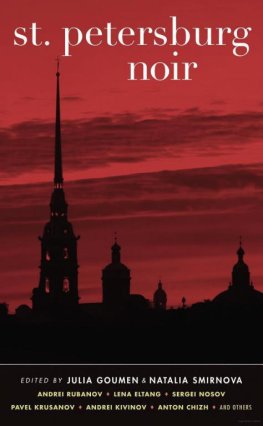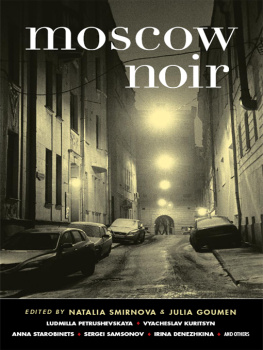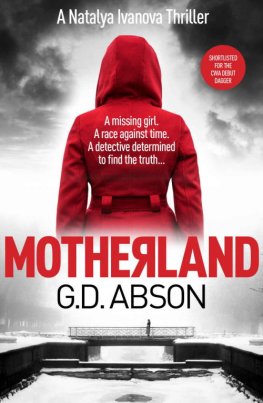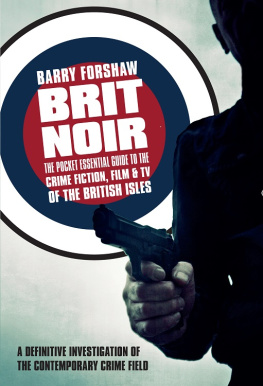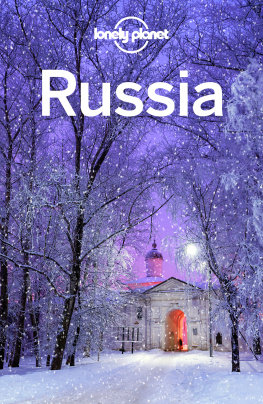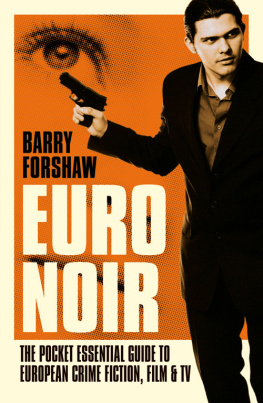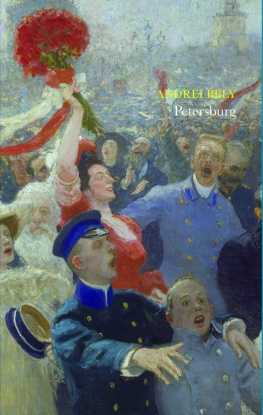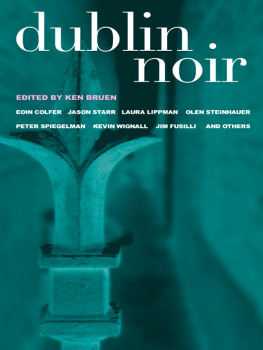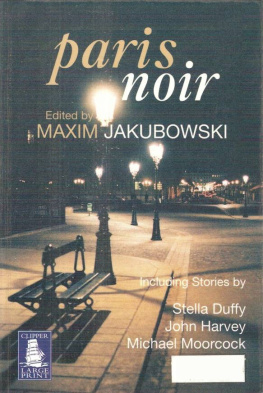ST. PETERSBURG NOIR
Edited by Julia Goumen & Natalia Smirnova


INTRODUCTION
Inescapable Anguish
When you think of the most noir city in Russia, the name that springs to mind is St. Petersburg. This link between the place, its character, and the genre has become quite paradoxically the biggest challenge for the authors in this anthology, who must balance their work with the citys rich noir tradition and at the same time transform daily criminal headlines into a literary experience.
Indeed, the tradition of noir writing in St. Petersburg features the greatest names of Russian literature. Most obviously, one thinks of the nineteenth century: Fyodor Dostoevsky (you can hardly find a more obvious noir spirit than in Crime and Punishments Kolomna settings, where Raskolnikov kills an old lady with an ax), Alexander Pushkin (my grandmother likes to recall how scared she was walking home in the city before World War II following the Mariinsky Theaters opera performance of Pushkins The Queen of Spades; and The Bronze Horsemana long poem about a disastrous floodis one of the creepiest stories in Russian literature), and Petersburg Tales by Nikolai Gogol. More recently, the early twentieth century contributed to the citys noir tradition with Andrey Belys novel Petersburg; followed later by the absurd, bleak writings of Daniil Kharms and Mikhail Zoshchenko.
Speaking of the latter twoPetersburg somehow nurtures ironic, satirical, and darkly humorous interpretations of reality. The darker and harsher life gets, the more humorous its interpretations tend to be. Indeed, only at a Petersburg house party could writers argue enthusiastically over the most efficient way to get rid of a corpse (with the deceased taking vodka shots next to them, vividly participating in the discussion). This anthology is no exception: in Andrei Kivinovs story, for instance, a dead body comes to life only to die again in an ironic salute to Gogol.
The origins of this rich noir tradition come from the citys history, its urban landscape, and even the weather, as Petersburgs climate undoubtedly affects local character. What morbid thoughts can freezing winds from the Baltics bring along? Which emotions swirl inside a person struggling through snowdrifts in the streets? How can one remain positive when the long-awaited northern summer offers less than a dozen sunny days?
St. Petersburg is an intentional city: established by the czars will as the inverse of Moscows old-style ruling, and an outpost to guard the countrys expansion to the north. But the initial purpose of the city has faded, and dwellers of St. Petersburg live in a place of broken grandeur incongruent with daily routine. Its denizens seek to move beyond the citys limitssometimes through cheap alcohol (as in Sergei Nosovs The Sixth of June), sometimes with the help of drugs (check out Andrei Rubanovs Barely a Drop).
Yet the conflict between the grandness, the imperial indifference of the citys architecture, and its dwellers remains painful. Each stone and monument in the city center breathes of history and purposewhile locals are like exhibits of the Kunstkamera: oddities gathered for examination or research, the purpose of which remains unclear. (This conflict has been elegantly examined in Eugene Kogans and Alexander Kudriavtsevs stories.) Enriching the citys already vast postmodern treasury, the authors of the anthology bring monuments and museums to life: a bust of Pushkin takes on flesh and color in Lialins Paranoia; college students become material for new taxidermy projects in Pavel Krusanovs Hairy Sutra.
Crime in Petersburg fiction is traditionally of a metaphysical nature. With a history densely filled with dark crimes, the citys atmosphere is saturated by a poisonous miasma coming from the swamps upon which it is builtan ideal condition for ghosts to haunt the landscape and folklore. Quite a few contributors have introduced ghosts or spirits into their stories.
St. Petersburg is famous for its canals, rivers, embankments, and bridges. This romantic landscape offers poetic comparisons to Venice in Italy, but also implies fluctuation, unsteadiness, fluidity that diffuses the local character and its morals. Since Pushkin, water has contributed to the gloomy and desperate atmosphere of the city: in his poem The Bronze Horseman, a flood kills the protagonists beloved girl, driving the hero insane. Water becomes a character in Lena Eltangs Drunk Harbor, and is also prominent in Kurchatova and Venglinskayas criminal tale, Anna Soloveys theatrical drama, and Vadim Leventals classic mystery investigation.
But reality, as often happens, proves more horrifying than any invented images. Crowded communal apartments in Kolomna (the statistics shock: in 2011 the number of citizens residing in such projects exceeded 660,000), drug abuse, sexual violence, and mandated killings in Russias criminal capital become a regular routine and give rich material for artistic interpretation. It is not surprising that many national TV crime shows have been set in St. Petersburgincluding The Streets of Broken Lamps, now in its twelfth season, Gangster Petersburg (2000-2007), and Deadly Force (fifty-seven episodes in five years; the show is based on Andrei Kivinovs script), to name a few.
Dark, grim, and terrifyingthese stories concoct a unique noir space of the city, mapping a very untouristic route for those who dare to explore its narrow streets, haunted shadows, and the intricate web of its black water.
The citys inescapable anguish will seize every reader of these stories, resonating to the maddening clopping sound of the Bronze Horseman.
Julia Goumen & Natalia SmirnovaSt. Petersburg, RussiaMay 2012
PART I
Gangsters, Soldiers & Patriots
TRAINING DAY
by Andrei Kivinov
Kupchino
Translated by Polly Gannon
Rise and shine, Eagle Scouts! Youve got a report. Leaving the door to the rec room open and not waiting for us to wake up, Evseyev returned to duty. I wasnt asleep anyway. I was just lying there with my eyes closed on top of an ancient, disintegrating overcoat spread out on some chairs I had pushed together. That was in contrast to Farid Ismagilov, the Tatar, snoring loud enough to wake the dead. I still hadnt learned to fall asleep at three in the afternoon. That was understandable: I didnt have enough practice. Although the idea of a postprandial nap made sense. If theres an opportunity to sleep during the day, use it. That way, at night, you wont keep yawning and nodding off if something happens. Farid, over there, was a guy with a lot of practice.
I got up off the chairs and put on my brown shoes. The standard-issue black ones didnt fit me, so I had to settle for civilian ones. The officers frowned on them, but the civilian population didnt give a damn, so I wasnt worried. No big deal, its not like shoes are your uniform cap. I straightened my tie, then nudged Farid, still sleeping on the bench.
Mister Driver, weve got a report to check out. Lets get going.
Farid woke up, rubbed his eyes, and yawned, exhaling a lethal reek of bacon and garlic. A Muslim, he scarfed down bacon for lunch despite the injunctions of the Koran. They called him Driver because he drove the official kozel jeep. In his free time, that is, when he wasnt sleeping. Rank: sergeant; age: thirty-three; disposition: Nordic, sometimes gloomy, with a slight chance of showers. Inclined toward mild, daily drunkenness. Whether he was an athlete or a good family man, I didnt know yet. Rooted for the Rubin Kazan soccer team.

